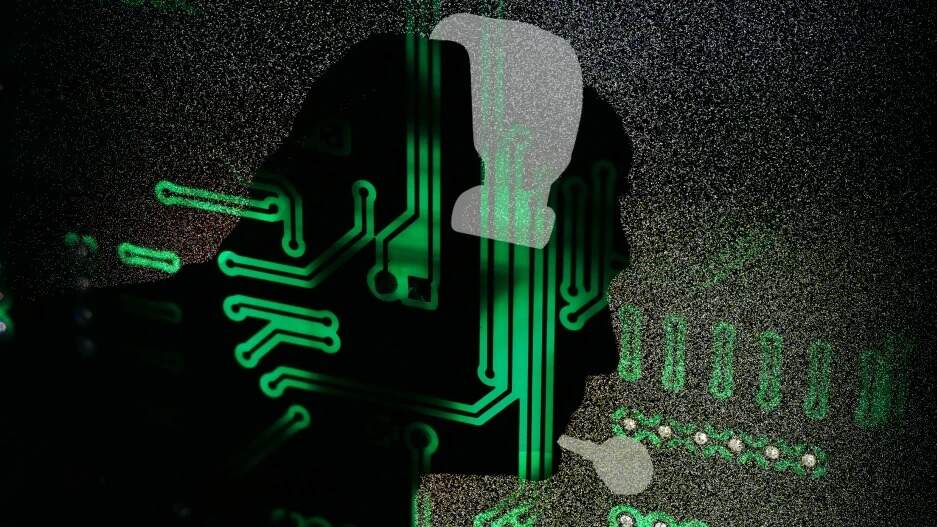- | 9:00 am
This is how AI is going to be your entry-level job coach
The interview simulator, named Boris, assesses everything from the content of your answer to your eye contact and posture.

As Hallo CEO Vern Howard shares his Zoom screen with me, I’m immediately transported back to the AOL era, with a window that pops up in the typical typewriter font of the instant messaging application. But this demo is far from the technology of AOL—it’s an AI-powered career coach named Boris designed to assist Gen Z students land a dream job as part of Hallo’s digital events and recruiting platform.
“There’s this massive disconnect, where students are going to college and they’re like, ‘Okay, what do I do to get a job at Pinterest?’ Career Services might not have that information, so our thesis is we want to build a platform that gives job seekers on-demand access to information,” says Hallo cofounder and CEO Vern Howard. Recent research revealed that Gen Z is more inclined than previous generations to job seek and network virtually.
After Howard uploads a sample résumé for Boris to analyze, the AI tool comes back in the messaging window with detailed suggestions for improving the résumé, from removing buzzwords to correcting spelling errors, all thanks to its training by Hallo engineers using OpenAI’s latest ChatGPT-4 technology and over 2 million data points to simulate an interview process and résumé review and provide detailed feedback.
But the most interesting part of the new tool is the interview simulator, in which a real-looking woman with short brown hair and a gentle smile appears on the screen to ask questions based on the résumé provided.
She doesn’t have a name, but she’s one of many mock interviewers that Boris deploys to mimic diverse leadership. As soon as Howard responds to her first question, she takes a minute to analyze every aspect of his response, from the content to even his posture, eye contact, and attire. She then gives him a score, accompanied by in-depth feedback on what was bad about his answer and how to improve it. Howard then has the option to try again or move on to the next question.
The main part of their new platform is this AI interview simulator, which Howard says is born out of a realization that students often don’t have methods to practice for the interview process. Boris essentially works sort of like editing service Grammarly in its résumé review section, especially encouraging students to add numbers to what they have accomplished, which Howard says is the No. 1 issue they’re seeing right now with students’ résumés.
The interview simulator, however, goes a step further, almost to make it seem like the user is speaking to a real person who is understanding and analyzing the responses.
“We had to really sit down and go through a ton of scenarios of what could happen, and we’ve tested this so much internally,” Howard says. “It was also very personal to me that our AI engineer was somebody from a diverse background because I wanted us to be able to implement diversity of thought from many different people.”
While Howard says the team is vigorously testing the AI tool and cross-training it with other data points so that Chat-GPT’s database isn’t the only technology providing answers, the service is ever-evolving with the progression of AI, as the team built the platform in just 20 days, and Howard acknowledges that there are limitations to overcome.
Still, the team wanted to get the platform out directly to students as a sort of supplement to traditional school career services. Howard says Boris will cost $5 a month, a number he based on the top platform he paid for in college for Spotify Premium. The team is marketing directly to Gen Z students and especially those who don’t have access to these resources otherwise. Some prospective students are paying up to $750,000 for college consultants to help them get into Ivy League schools, according to Bloomberg.
“What if we can use this technology to really broaden access and do some good?” Howard says. “I’m cool with everybody looking up how to make, you know, a bundt cake on Chat-GPT, but I think there’s use cases for AI that are very interesting to help people, and education spaces are where I’m focused right now.”
Hallo isn’t the only company venturing into the AI career coach realm, with companies like CoachHub, Rocky.ai, and Bayes Impact, among others, debuting conversational AI coaches. As the tech world leans more into the developments of OpenAI, the switch to AI-based tools is becoming all the more prevalent. That’s not to say the technology hasn’t hit bumps in the road, though—it’s clear that AI is creating trust issues and still has yet to solve hallucinations and data leaks, even causing direct harm in some cases like vaccine management.
But for Hallo specifically, which also hosts networking events and provides scholarships to students, the future and potential that AI holds presents exciting opportunities to help students at a low cost so that, in the near future, Boris might be able to pre-screen candidates and then recommend them directly to companies for hiring.
“We’re super excited about the future AI, super excited about the interview simulator—I think it’s going to be a game changer for students,” Howard says. “We want to kind of be that helper there for students, universities, as well as companies, with a laser focus on diversity of thought.”







































